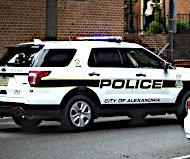10/3/2019
Alexandria, Virginia Caught Issuing Inaccurate Speeding TicketsRefunds ordered for 2169 speeding ticket recipients in Alexandria, Virginia after employee faked police car speedo tests.

The city of Alexandria, Virginia, on Wednesday admitted police have been issuing speeding tickets based on faulty evidence for the past three years. The snafu affected 2,169 of the 19,658 speeding tickets issued by the department in that time.
The citations in question were handed out the old-fashioned way after police paced the other vehicles using the squad car's speedometer as the basis for a speed estimate. Those speedometers had not been properly calibrated, as required under state law. Robert Snyder, the city's internal auditor, issued a report in June that documented the "informal" methods being used by the city to verify speedo accuracy.
"Staff members had difficulty articulating ethical concepts or an understanding of the ramifications of failure to properly complete the functions of the calibration process," Snyder wrote in his report.
The city is supposed to test each police Ford Explorer and Ford Interceptor on an all-wheel-drive Mustang dyno every six months, but a particular employee was caught in 2017 using one squad car to generate bogus calibration reports for four other police cars. Instead of firing this employee, the city allowed him to continue as a calibrator through the beginning of this year. So he "calibrated" another 109 police cars. The auditor found 32 calibratons were done "in a suspiciously short time period." Other calibrators proved to be confused and could not properly explain calibration methods to investigators.
The mistakes they made were significant, as 107 Ford Explorer and Ford Interceptor squad cars had speedometers that were off by more than 3 MPH. According to the city, police officers had no idea their speedos were off. In addition, some 28 percent of the police cars were not calibrated within the required six month interval. A handful of these had lapsed calibrations for up to six weeks.
The auditor recommended retraining all of the calibrators with a focus on reinforcing clear instructions and ethics. The city updated its policy to require speedometers to be accurate within 2 MPH instead of 3 MPH. The fallout for the incident could prove costly to the city, as several motorists may have lost their license or been booked for reckless driving based on the faulty calibration.
Motorists who received a speeding ticket may use this link to request a refund from the city. A copy of the audit report from June is available in a 2mb PDF file at the source link below.


